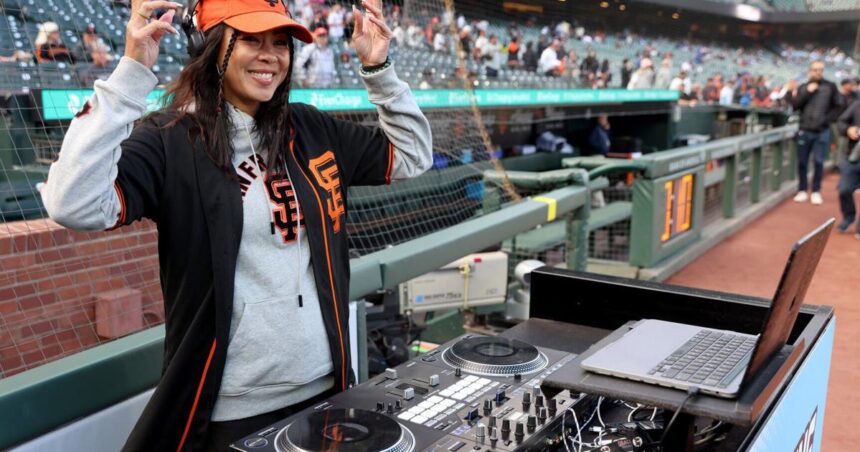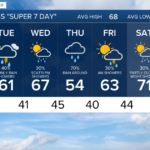Oracle Park, like any ballpark, features its share of old-school sonic sensibilities. There’s “Bye-Bye Baby” after home runs, “Take Me Out to The Ball Game” during the seventh-inning stretch and Steve Hogan on the organ during day games. They’re traditional. They’re familiar. They’re nostalgic.
But when Ieanna Cruz gets behind the turntables, tradition takes a backseat. She provides a vibe that’s new. That’s fresh. That’s hyphy.
A Filipina American hailing from East Side San Jose, Calif., Cruz, otherwise known as DJ Umami, serves as the Giants’ resident DJ, not only providing a flavor that remains unique to baseball but paving the way for the next generation of women of color.
“For the longest time, it seemed like we played the same music,” said Brandon Crawford, the former Giants shortstop who served as the team’s clubhouse DJ, going by DJ BC Raw. “Nothing against that, but it seemed a little bit boring in between innings sometimes before DJ Umami got there. She definitely brought more energy to the park.”
People are also reading…
“She mixes it up and has that flavor — the San Francisco flavor,” said LaMonte Wade Jr. “She definitely gets the fans involved and gets them hyped up, but also gets the players excited to play as well during batting practice, getting us in a good mood.”
Cruz is embedded into the fan experience at Oracle Park. Just about every stadium has some form of a DJ presence, but few ballparks make their DJs a prominent personality. Over the course of a game, Cruz shows off her Bay Area sensibilities.
Before games, she sets up near the home dugout and provides the soundtrack to batting practice. During games, Cruz performs sets at The 415 in right-center field in the middle of the fourth and seventh innings, playing familiar slaps such as Too $hort’s “Blow the Whistle” or culturally relevant tracks such as Kendrick Lamar’s “Not Like Us.”
For those brief moments, Cruz, wearing a “No Requests” tattoo on her left index and middle fingers, transforms Oracle Park into a house party. It’s not uncommon for the video scoreboard to feature fans hitting iconic Bay Area dances such as The Smeeze, Brookfield, or Thizzle Dance — at a baseball game.
“The Bay Area is known for its energy,” said friend and mentor Paolo Bello, otherwise known as DJ Cutso. “It’s known for being hyphy. It’s known for its DJ culture. Who better to have out there than someone like Umami?”
“Before I even knew I was into DJing, I knew her through the Giants game that I would attend,” said Caroline Clemente, who also goes by DJ BB Carolz. “It’s always incredible to see women represented. Seeing a woman represented in sports on such a huge scale (allows) girls to think that this is something they can do.”
Cruz’s musical roots began in childhood, singing in addition to playing piano and guitar. DJing, though, was an acquired taste. Cruz was introduced to the art by a childhood neighbor, but at the time, she didn’t believe the medium was for her. That sentiment soon changed.
In 2009, Germel Boado, a friend of Cruz’s who goes by G-Wrex, began hosting a recurring party at San Francisco’s Poleng Lounge. Boado knew Cruz had an interest in DJing. By this time, Cruz had purchased a Technics SL-1200, learning the fundamentals with the help of Bello. Boado asked Cruz if she’d like to be part of a lineup. Cruz declined Boado’s first handful of invitations, but Boado kept on asking. Eventually, Cruz accepted.
“I’m just going to be real: I didn’t know if she was going to be good or not,” Boado laughs.
On May 15, 2009, the night of her DJ debut, Cruz didn’t have a stage name — she was just Ieanna. A friend had suggested Cruz go by “Lady Whirlwind,” an ode to the 1972 movie of the same name, but Cruz didn’t think the name fit. Before her second gig, her musical moniker was born at a friend’s house.
“I was like, ‘Man, I’ve been craving parmesan cheese for some reason, can you make something with some parmesan in it,’” Cruz recalled asking her culinary-inclined friend. “And he was like, ‘Oh, you like the umami.’ I was like, ‘What is that?’ He said, ‘It’s the Japanese term for the fifth flavor.’ … I thought it was a good DJ name. So, I ran with that.”
With her stage name in tow, Cruz began becoming a prominent name in the Bay’s music scene. Soon after her debut, Cruz became part of The Peaches Crew, an all-female Bay Area DJ collective, and regularly performed at Skylark in San Francisco. In 2012, Cruz began occasionally gigging for the Warriors.
Cruz balanced music with a job in tech sales during her first years as a DJ, occasionally leaving her day job early to travel to Oracle Arena. In 2016, Cruz was told those half-days were no longer available. She made an “impulsive” decision: pursuing music full-time.
With her schedule open, Cruz took just about every opportunity thrown her way. Given her rising stock, opportunity was abundant. Along with the Warriors, she opened for the likes of Questlove, Anderson .Paak, and Big Boi, playing at events such as Outside Lands and SXSW (South by Southwest), working for Google, Nike, and Twitter, landing a weekly residency with radio station Q102 FM.
During her time with the Warriors, Cruz met Marco Nicola, the team’s manager of game experience. Upon joining the Giants in 2019, Nicola recruited Cruz to work weekends at Oracle Park. Following the fanless 2020 season, the Giants prioritized incorporating a DJ into the gameday experience as they re-opened the ballpark to fans in 2021. For Nicola, Cruz was the first DJ who came to mind.
“She’s this super warm, engaging, authentic personality who people are naturally drawn to,” Nicola said.
Added Bello: “She’s a very soulful woman, but she can also be very rough and tumble and hyphy. That’s what people love about her.”
Love, however, wasn’t always present.
Cruz grew up familiar with existing in male-centric spaces. She did her best Jerry Rice impression as the only girl in a flag football league — a league she joined simply because there were no other girls. Entering the DJ space felt natural, but familiarity didn’t mean acceptance.
As Bello recalls, Cruz was one of the few women DJs present in clubs during her early years; most women DJs, in Bello’s estimation, were in the rave or underground scenes. Cruz stood out, and while she had the likes of Bello and Boado in her corner, several contemporaries weren’t so welcoming.
Cruz recalled an early experience with a male DJ she admired that “wrecked” her. She was depressed for several weeks. There were some days that she could not get out of bed. She questioned herself.
“She really had to overcome the criticism from the men in the DJ game, especially in the Bay Area,” Bello said. “There were quite a few people who we grew up with who took a distaste for her because they thought she was part of the novelty.”
As Cruz was learning the nuances of turntables, she was also learning the nuances of motherhood. She had Ajrien, her older son, at 16, and Demarcus, her younger son, at 19. Cruz praised her parents for providing support when Ajrien and Demarcus were young, allowing her a brief reprieve from parenthood and allowing her to gig.
Cruz’s impact isn’t just measured in how she can move a crowd, but how she influences the next generation. It’s not uncommon for young women to approach Cruz during games and tell her what she means to the community. When Bello taught a six-week course for the Ladies First DJ Club, he brought in Cruz as a guest speaker to discuss her journey.
“She’s almost kind of a pioneer in the scene, especially for the new generation,” Bello said. “She’s one of the OGs. She’s been consistently gigging and, for lack of a better term, doing her this whole time.”
“Filipina girls now are thinking, ‘If she could do it, I could do it, too,’ ” Boado said.
Reflecting upon those early years, she affirms that the adversity made her better. She wanted other DJs to know that she was getting gigs simply because her work was ill. Time and experience created confidence. She’s proved herself.





